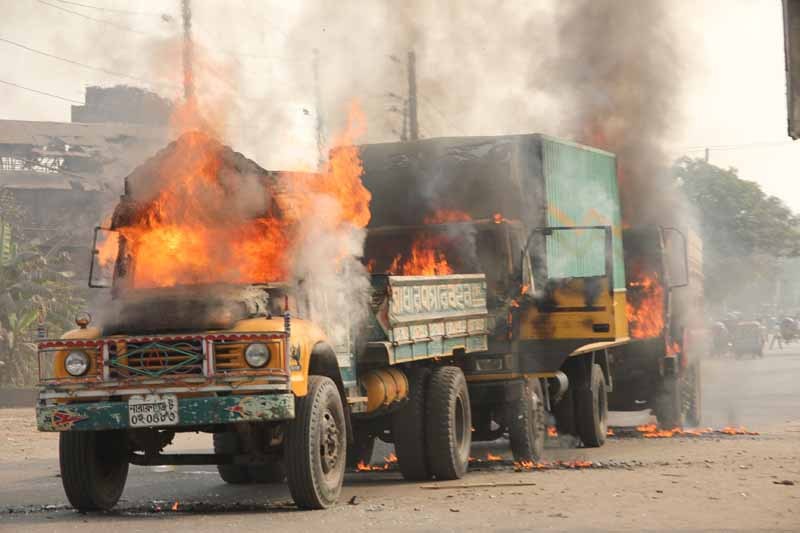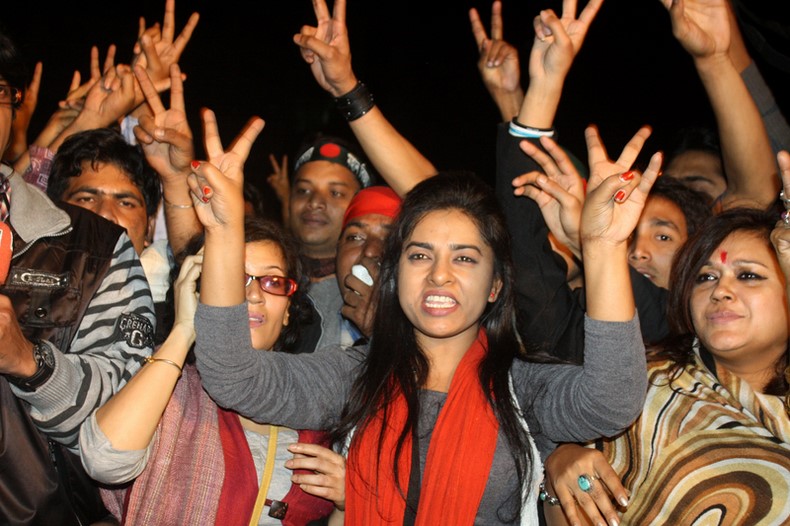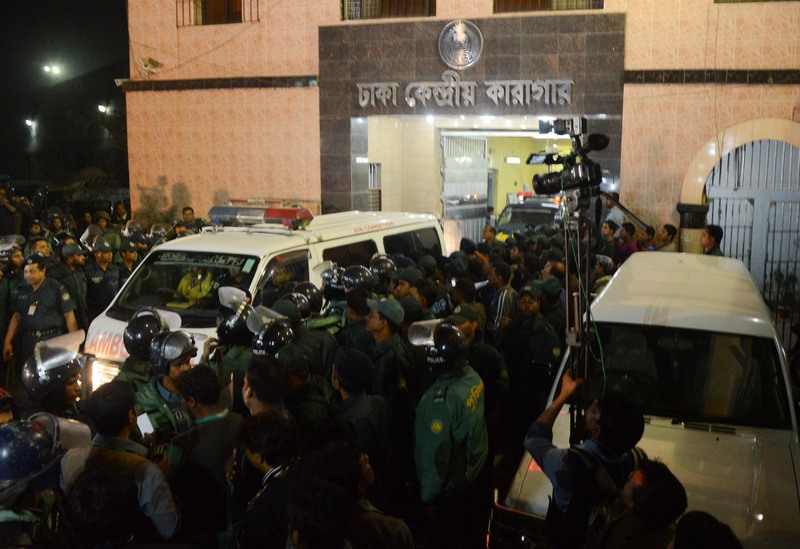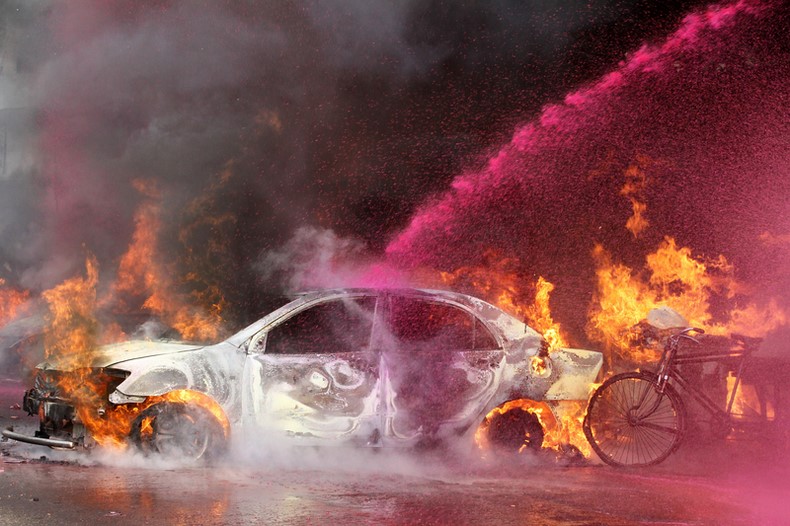Abdul Quader Mollah, the assistant secretary general of right-wing Islamist party Bangladesh Jamaat-e-Islami convicted of crimes against humanity during Bangladesh's bloody liberation war from Pakistan in 1971, was executed inside the capital city Dhaka's Central Jail late 12 December 2013.
The hanging sparked a wave of deadly violence from supporters, leaving several dead and a number of homes and businesses torched.
Quadar Mollah was the first to die for war crimes committed during the struggle for independence, in which an estimated 300,000 and three million people were killed and 200,000 women were raped. Jamaat-e-Islami joined forces with Pakistan's secret service to form militia groups such as Razakars & Al-Badr ("the moon") to fight against the nationalist movement and freedom fighters. These forces aided Pakistani forces in the killings.
As a member of Jamaat's student wing Islami Chatra Sangha, Quader Molla joined Al-Badr and, according to charges framed against him, led a mass killing in Mirpur, thus earning the name Butcher of Mirpur among locals. He was also responsible for the shooting of 344 people, the rape of an 11-year-old girl, and the beheading of a poet.
After the formation of Bangladesh's International Crimes Tribunal in 2009 to prosecute those who participated in the war's genocide, he was arrested 13 July 2010, and more than a year later on 18 December 2011, he was formally charged with six charges and 344 counts of murder. On 5 February 2013, he was given a life sentence, with an additional 15-year sentence, for his crimes.
But the verdict sparked massive protests demanding his death as well as an end to extremism in politics. Thousands of people joined the demonstrations in Dhaka's central square, which became known as the #2013 Shahbag protests (see Global Voices special coverage page).
The government appealed against Quader Mollah's first verdict, and on 17 September 2013, the Bangladesh Supreme Court found him guilty of murders and other war crimes and converted his life sentence to a death sentence.
So far, 12 people excluding Quader Mollah have been arrested and the trials are ongoing in different stages. A number of them have already been awarded with sentences ranging from life imprisonment to death. Members of political party Jamaat have led protests against the trials, alleging that the government is trying to suppress the opposition through the trials.
There have been intense Twitter campaigns from #Shahbag activists (using hashtags like #shahbag & #BanJamaat) in favor of the execution and Jamaat supporters (using hashtags like #FreeQuaderMollah, #WeAreQuaderMollah, #MartyrAbdulQuaderMollah), with some of the hashtags trending on given days. Activist Allan Turing (@turing1010) thanked the #Shahbag movement and tweeted:
Ishtiaq Al Mahmud (@iamahmud) provided an update on the Jamaat violence after the execution of Quader Mollah:
The hanging sparked a wave of deadly violence from supporters, leaving several dead and a number of homes and businesses torched.
Quadar Mollah was the first to die for war crimes committed during the struggle for independence, in which an estimated 300,000 and three million people were killed and 200,000 women were raped. Jamaat-e-Islami joined forces with Pakistan's secret service to form militia groups such as Razakars & Al-Badr ("the moon") to fight against the nationalist movement and freedom fighters. These forces aided Pakistani forces in the killings.
As a member of Jamaat's student wing Islami Chatra Sangha, Quader Molla joined Al-Badr and, according to charges framed against him, led a mass killing in Mirpur, thus earning the name Butcher of Mirpur among locals. He was also responsible for the shooting of 344 people, the rape of an 11-year-old girl, and the beheading of a poet.
After the formation of Bangladesh's International Crimes Tribunal in 2009 to prosecute those who participated in the war's genocide, he was arrested 13 July 2010, and more than a year later on 18 December 2011, he was formally charged with six charges and 344 counts of murder. On 5 February 2013, he was given a life sentence, with an additional 15-year sentence, for his crimes.
But the verdict sparked massive protests demanding his death as well as an end to extremism in politics. Thousands of people joined the demonstrations in Dhaka's central square, which became known as the #2013 Shahbag protests (see Global Voices special coverage page).
The government appealed against Quader Mollah's first verdict, and on 17 September 2013, the Bangladesh Supreme Court found him guilty of murders and other war crimes and converted his life sentence to a death sentence.
So far, 12 people excluding Quader Mollah have been arrested and the trials are ongoing in different stages. A number of them have already been awarded with sentences ranging from life imprisonment to death. Members of political party Jamaat have led protests against the trials, alleging that the government is trying to suppress the opposition through the trials.
There have been intense Twitter campaigns from #Shahbag activists (using hashtags like #shahbag & #BanJamaat) in favor of the execution and Jamaat supporters (using hashtags like #FreeQuaderMollah, #WeAreQuaderMollah, #MartyrAbdulQuaderMollah), with some of the hashtags trending on given days. Activist Allan Turing (@turing1010) thanked the #Shahbag movement and tweeted:
Thank you #Bangladesh & #Shahbag, this is the beginning of a new era, secular and independent nation :) 'V'
— Alan Turing (@turing1010) December 12, 2013
Many netizens commented that the nation has cleared the blemish of impunity with this execution. Blogger Ekramul Haque Shamim posted a status on Facebook:
কাদের মোল্লার ফাঁসি কার্যকর। দায়মুক্তির সূচনা এখানেই। জয় বাংলা।
The execution of Quader Mollah Complete. The end to impunity. Joy bangla.Blogger Avijit Roy mentioned on Facebook that Bangladesh has entered a new phase:
আজ যুদ্ধাপরাধী কাদের মোল্লার ফাঁসির সাথে বাংলাদেশ নতুন দিনে, নতুন যুগে, নতুন জগতে প্রবেশ করলো। অনেক দুঃখ পেয়েছি মা এই বছরটায়, আশা করি বিজয় দিবসটা এবার নতুন আলোয় অন্যরকম একটা ভোর দেখবে।...
Today we entered a new phase, a new day, a new era of Bangladesh. We have suffered through many sorrows this year, hope we will see a new dawn on Victory Day [16 December].Twitter user Royesoye (@royesoye) reminded readers that Bangladeshis had been waiting for this trial and justice for 42 long years:
After 42 years, we tried and executed one of the monsters who participated in one of the cruelest genocide in 20th century. #JoyBangla
— royesoye (@royesoye) December 12, 2013
Here are more reactions:
Why people of Bangladesh is demanding death penalty of Quader Mollah?? Here is the reason! #shahbag pic.twitter.com/wtpqeFVckd
— ChLoeyy (@_chloey_001) December 12, 2013
[DEAR WORLD] The Mass Movement in @Bangladesh is not against “Islamists” by @moshahidas http://t.co/VAc5WsVCuc #Righton #RT #shahbag
— Shahbag Worldwide! (@Projonmo13) December 13, 2013
Angry Jamaat warns of dire consequences | Sets alight house of ex-minister: http://t.co/fsvqjJQccp #Shahbag
— Ruhin Afrin Joyee (@rajoyee) December 10, 2013
#Jamaat threatens to burn 56,000 square miles. It is still Government's fault, right? http://t.co/zs3Mm2R3HD #Shahbag @nytimes @andyrNYT
— Enamul Hoque (@enamul1hoque) November 22, 2013
I reject the verdict of Quader Mollah #FreeQuaderMollah Send in your picture with this message! pic.twitter.com/7L1L6QICpU #Bangladesh
— RT 2 #SaveBangladesh (@RT_SaveBD) September 19, 2013
Abdul Quader Mollah death sentence violates international law http://t.co/qJ816FE6Ut #SaveBangladesh #FreeQuaderMollah
— Mahfuz Nahid (@MahfuzNahid) September 19, 2013
UN experts, Human Rights Watch and other organizations urged Bangladesh government not to carry on with the execution over fair trial concerns. However, netizens reacted:
Where is @UN when people die on the streets every day from violence by Jamaat? Human rights only for the powerful eh? #shahbag
— AD (@m0th3rh3n) December 10, 2013
Blogger Kalo Kak (Black Crow) at Choturmatrik wrote:
কাদের মোল্লার ফাঁসির দিনে Jang Song Thaek নামে নর্থ কোরিয়ার একজন সাবেক ক্ষমতাধর ব্যক্তির’ও মৃত্যদন্ড কার্যকর হয়েছে। নর্থ কোরিয়া কাউকে পাত্তা-টাত্তা দেয়না বলে সেখানে গিয়ে নাক গলানো সম্ভব না। কিন্তু মানবাধিকার সংগঠনগুলোর হলো কী? তারা তো একটু শব্দ-টব্দ করতে পারতো? করেছে কেউ? আমার গুগলমতে না। [..] বিশ্ববাসীর সিলেক্টিভ মানবতা দেখছি!
On the day of the execution of Quader Mollah, an influential political leader from North Korea Jang Song Thaek was executed. North Korea doesn't bother any country so it is hard for others to stick their noses in there. But what happened to the human rights organizations? They could have protested. Did anyone do it? I googled and found none. [..] I am witnessing selective concern of human rights amongst the people of the world.From the opposite camp, Shahnur Begum (@ShahnurBegum) addressed those who were celebrating the execution:
"আয়রনি আর আয়রনি" #WeAreQuaderMollah.কাদের মোল্লার মৃত্যুতে যারা খুশি, তারা কেউ তাঁকে খুন,ধর্ষণ করতে দেখেনি.https://t.co/ypej4jmoRS
— Shahnur Begum (@ShahnurBegum) December 13, 2013
Irony & irony, #WeAreQuaderMollah Those who are celebrating the execution have never seen him murder or rape anyone.Blogger I am Opimist wrote that the verdict has divided the nation:
আয়রনি হচ্ছে, বেয়াল্লিশ বছর অপেক্ষা করে যেই রায় দেয়া হলো এবং কার্যকর করা হলো, যাতে বেয়াল্লিশ বছর আগের ক্ষত ভুলে আমরা একসাথে সামনে আগাতে পারি, সেই রায়ই দেশের মানুষকে শত ভাগে ভাগ করে দিয়ে গেল। [...]
The irony is that the verdict, which came after 42 years and was executed, was meant to be part of the reconciliation and a way forward, but instead it had divided the nation. [..]After the execution of Quader Mollah, violence led by supporters of Jamaat left several people dead. Activists also vandalized and burnt minority Hindu homes and shops, and the home of one judge working in the war crimes tribunal was attacked with a petrol bomb. The party has maintained that the execution was politically motivated and has called for a dawn to dusk strike on 15 December 2013.
 |
| Jamat e Islami activists in Bangladesh set four vehicles on fire in response to Abdul Quader Mullah's execution. Photo by Mahbubur Rahman Khoka. Copyright Demotix (13/12/2013) |
10 killed in Jamaat-Shibir men unleashed violence on political rivals in #bangladesh http://t.co/xjs1Xqr3Sn @UNHRC @amnesty #shahbag, — Istiaque Al Mahmud (@iamahmud) December 13, 2013Blogger and online activist Kallol Mustafa wrote that it is important to arrest the people involved in the Jamaat mayhem as soon as possible:
কুখ্যাত রাজাকার কাদের মোল্লার ফাঁসিকে কেন্দ্র করে বরাবরের মতোই জামাত সারা দেশে পরিকল্পিত ভাবে তান্ডব চালাচ্ছে- হিন্দু পল্লী,সরকারি প্রতিষ্ঠান, দোকান-পাট, ব্যাবসা প্রতিষ্ঠান, জানবাহন ইত্যাদি এই জামাতি তান্ডবের লক্ষ বস্তু । শুধু জামাতি সেন্ট্রাল কমান্ড নয়, গ্রাম-থানা-উপজেলা-জেলা-বিভাগ পর্যায়ের জামাত-শিবিরের ‘তান্ডব সংগঠকদের’ সমন্বিত প্রচেষ্টা ছাড়া এটা সম্ভব নয়। তাৎক্ষণিক ভাবে তান্ডব ঠেকানোর পাশাপাশি এই ‘তান্ডব সংঠকদের’ দ্রুত সানাক্ত করে গ্রেফতার ও বিচারের আওতায় আনা এখন সবচেয়ে জরুরী কাজ।
Jamaat has unleashed a wave of planned violence stemming from the execution of Quader Mollah. Hindu installations, government offices, private commercial premises, transport are the focus of their destruction. This requires a massive coordination between Jamaat central command and the arms of violence. So it is mandatory to resist the violence and rampage and arrest the masterminds.Pallab Muhaimen protested on Facebook:
কাদের মোল্লাকে Islamist leader বলা হচ্ছে দুই জায়গায়। এক. জামাত বলছে। আর দুই. পশ্চিমা গণমাধ্যম। পশ্চিমা গণমাধ্যমের শিরোনামে war criminal লিখতে কেন এত কষ্ট? ব্যতিক্রম হিসেবে রয়টার্স ও এএফপি তবুও কিছুটা যুদ্ধপরাধের কথা যুক্ত হয়েছে।
Quader Mollah is being named as an "islamist leader" on two fronts. One: Jamaat is propagating this. And two: the Western mainstream media. Why is it too hard to write "war criminal"? Only exceptions are Reuters and AFP who had mentioned about his war crimes.



























0 comments:
Post a Comment